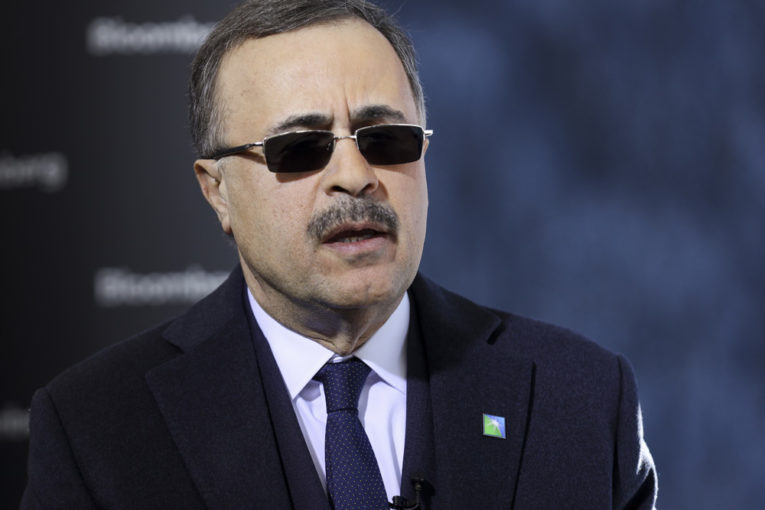
DAVOS — As Davos delegates walk to their meetings, they’re overlooked by the largest billboard in town. The message mixes confidence and defiance — “Invest Saudi: The Future-Forward Economy.”
Only three months ago, the global elite largely shunned Saudi Arabia’s own version of Davos after the murder of Jamal Khashoggi. Now, Riyadh is using the real thing to attempt a reconciliation with the business world, making nice in the Swiss mountain resort’s universal language: money. Plans for economic reform, big capital market deals and global investments mean A-list bankers and executives are inclined to listen.
At an event where success is often measured by who’s seen at a reception or speaks on a panel, the Saudis aren’t getting the cold shoulder any more. James Gorman, the head of Morgan Stanley, spoke on Thursday in a debate alongside two Saudi ministers. And the likes of Jamie Dimon of JPMorgan Chase & Co. and John Flint of HSBC Holdings Plc attended the annual Davos party thrown by Saudi oil giant Aramco, according to a person present.
“We don’t have any problem,” Amin Nasser, Aramco’s CEO, said when asked about the impact of the Khashoggi crisis. It’s a view largely shared by other members of the Saudi delegation to the World Economic Forum.
Still, the effort to reconcile with the business world also shows the extent of the damage the kingdom suffered after Khashoggi’s murder in Istanbul in early October, a prominent Saudi columnist who wrote for the Washington Post. The U.S. Senate blamed the country’s de facto ruler, Crown Prince Mohammed bin Salman, for the killing.
“The Saudis are testing what the international reception is going to be,” said Meghan O’Sullivan, a professor of international affairs at Harvard University and a senior White House official in George W. Bush’s administration.
The Khashoggi crisis, together with lower oil prices and production, has hit the Saudi economy. As Davos started on Monday, the International Monetary Fund cut its forecast for the country’s economic growth in 2019 to 1.8 per cent, well under the 2.4 per cent it initially expected, and lower than 2018. With oil revenue constrained, Riyadh will struggle to stimulate the economy without taking on more debt or depleting its petro-dollar reserves.
Saudi officials and executives nonetheless believe that investors will return to the kingdom despite the political and public uproar.
“There is a recognition that this was a truly, truly unfortunate event,” Mohammed Al Kuwaiz, chairman of the Saudi Capital Market Authority, said. However, “emerging markets around the world are risky and I think risks are inherent in all investments in emerging markets,” he added.
Riyadh has sent a large delegation to the World Economic Forum, including Economy Minister Mohammad Al Tuwaijri and Finance Minister Mohammed Al-Jadaan as well as recently appointed Foreign Minister Ibrahim Al-Assaf, a Davos veteran. The head of the country’s sovereign wealth fund, Yassir Al-Rumayyan, is also in the Swiss ski resort, along with private sector executives such as billionaire businesswoman Lubna Olayan.
Time to move beyond Khashoggi’s death: ‘Let’s look more positively and move forward.’
Total SA chief Patrick Pouyanne
Saudi officials have scheduled roughly 100 meetings with policy makers and businessmen in Davos, according to one person familiar with the agenda who asked not to be named discussing private information.
In addition to Saudi Aramco’s traditional Davos reception on Wednesday evening — where bankers and oil executives where treated to holograms showcasing the kingdom’s largest oilfields — the MiSK Foundation, founded by Prince Mohammed, also hosted an event for a second year.
Saudi officials are so confident that Aramco is even thinking about investing in America, where many lawmakers are hostile. “I don’t see any issues — quite the opposite — in terms of our investment, it’s welcomed,” Nasser said.
Even before Davos, Saudi leaders were heartened by the international support for its recent U.S. dollar bond sale. Although the kingdom paid a bigger premium to U.S. Treasuries than in previous years, demand was healthy.
In a further sign of the optimism in the kingdom, Aramco is about to go ahead with its first-ever international bond, asking banks this week to provide offers to handle a multi-billion debt raising. And the oil giant is again talking about an initial public offering, albeit delayed until 2020 or 2021.
Speaking on the same panel as Morgan Stanley’s Gorman, the head of French oil giant Total SA, Patrick Pouyanne, said it was time to move beyond Khashoggi’s death: “Let’s look more positively and move forward.”
— With assistance from Ruth David.
Bloomberg.com
You can read more of the news on source
